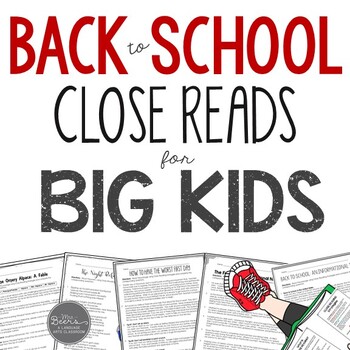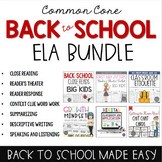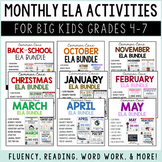Back to School Close Reading Passages with Comprehension Questions
- PDF
Also included in
- This Back to School ELA Bundle includes the perfect standards-based resources to engage your students during the exciting Back to School time. This unique collection includes tools for read to self, read to someone, listen to reading, word work, and writing...all centered around a back to school thePrice $15.00Original Price $23.50Save $8.50
- Do your students need more close reading work to practice their reading comprehension skills? This bundle of thematic and seasonal close reading passages is the perfect tool to learn and implement close reading strategies all year long.This bundle includes 10 monthly/seasonal units, each with 5 highPrice $24.00Original Price $43.75Save $19.75
- This bundle of monthly ELA activities for middle school includes the perfect standards-based resources to engage your students throughout the school year. Use these print-and-go resources to give your students practice reading to self, reading to someone, listening to reading, word work, and writingPrice $105.00Original Price $167.50Save $62.50
Description
Do your students need more close reading work to practice their reading comprehension skills? This bundle of Back to School reading passages is the perfect tool to learn and implement close reading strategies.
Included in this 16-page resource:
• Inspiration and Directions for Use
• What is Close Reading?
• Close Reading Strategies
• The False Start: Fictional Narrative (1080L)
• Back to School: Informational Text (1300L)
• How to Have the Worst First Day: Expository Text (1000L)
• The Night Before: Poem (690L)
• The Ornery Alpaca: Fable (780L)
• Answer Key
Estimated Lexile Measure: 690-1300L
Directions for Use…
• Use for weekly reading homework, center work, read-to-self, read-to-someone, whole class strategy work, small group, or one-on-one intervention. The uses are endless.
• Copy passages, questions, and organizers.
• Teach students the Close Reading Strategies-FRUIT
• Watch as your students become more engaged, independent readers capable of answering text dependent questions.
• Back to school is the perfect time to incorporate close reading into your ELA classroom.
*********************************************************************
Monthly ELA Activity Bundles from Mrs. Beers Language Arts Classroom:
- Full Year Bundle of Monthly ELA Activities
- Back to School ELA Activities Bundle
- October ELA Activities Bundle
- November ELA Activities Bundle
- December ELA Activities Bundle
- January ELA Activities Bundle
- February ELA Activities Bundle
- March ELA Activities Bundle
- April ELA Activities Bundle
- May ELA Activities Bundle
- Summer ELA Activities Bundle
*********************************************************************
More Bestsellers from Mrs. Beers Language Arts Classroom:
- Reader's Theater for BIG KIDS MEGA BUNDLE
- Editable ELA Word Wall for Middle School
- ELA Emergency Sub Plans Bundle Grades 4-8
- Wonder Novel Study Unit
- Context Clue Task Cards for Middle School
- Poetry Analysis Resource for Grades 4-8
I would love your feedback on this close reading resource. Did you know that by providing feedback you have the chance to earn points that will discount future Tpt purchases? Also, be sure to follow me so you are aware of new ELA products as soon as they are posted.
Happy Close Reading!
Erin
Common Core Standards: RL.4.1, RL.4.4, RL.4.10, RL.5.1, RL.5.4, RL.5.10, RL.6.1, RL.6.4, RL.6.10, RI.4.1, RI.4.10, RI.5.1, RI.5.10, RI.6.1, RI.6.10








